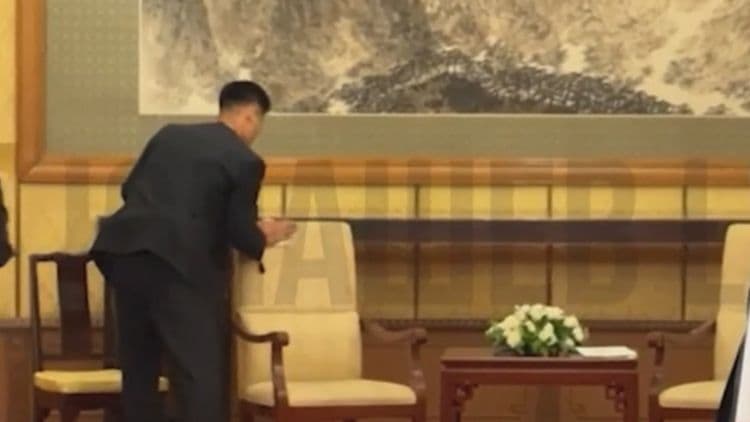
Video has emerged of North Korean staffers meticulously removing all traces of leaderKim Jong-un's presence after he met with Russian President Vladimir Putin in Beijing.
The two leaders were invited by Chinese President Xi Jinping to attend an event commemorating the 80th anniversary of the defeat of Japan in World War II, followed by a parade showcasing China's military arsenal.
Kim had sit-down meetings with both Xi and Putin, the leaders of the only two nations in the world with which North Korea has mutual defence treaties.

After the Putin meeting, Kremlin reporter Alexander Yunashev posted a video to Telegram showing two of Kim's staffers thoroughly cleaning the room the pair had used.
"After the negotiations were over, the staff accompanying the head of the DPRK carefully destroyed all traces of Kim's presence," he wrote.
The Japanese news outlet Nikkei also reported Kim had taken his own toilet to the event.

Such protocols are standard procedure for the reclusive nation, even when Kim meets with friendly nations.
"The special toilet and the requisite garbage bags of detritus, waste and cigarette butts are so that a foreign intelligence agency, even a friendly one, does not acquire a sample and test it," US-based North Korea expert Michael Madden of the Stimson Centretold Reuters.
"It would provide insight into any medical conditions affecting Kim Jong-un."

Kim travelled to Beijing in a special train so heavily armoured its top speed is just 60km/h.
In recent years, North Korea has moved closer to Russia as Putin turned to Kim for weapons and troops to sustain his war on Ukraine.
Last year, the two leaders signed a landmark mutual defence pact in Pyongyang, committing to provide immediate military assistance to each other if under attack – a move that has rattled the US and its Asian allies.
Analysts say Xi was likely watching warily as Putin and Kim forged a new alliance that could complicate East Asia's fragile security balance, draw more US focus to the region, and undercut Beijing's efforts to manage stability on the Korean Peninsula.

Beijing is worried that Moscow's assistance to Pyongyang in return for its weapons and troops – especially on military technology – would further enable and embolden the erratic Kim regime, which has drastically accelerated the buildup of nuclear weapons and missile programs.
Edward Howell, a lecturer in politics at the University of Oxford, said China is not"angry" at the rapprochement between North Korea and Russia, but"emetic, nauseous, and uneasy."
"After all, prior to the Russia-North Korea (mutual defence) treaty…North Korea was the only country with whom China had a mutual defence pact, and vice versa," he said.
Were China truly angry about the deepening cooperation, it could put an end to it by no longer helping North Korea evade sanctions or no longer enabling Russia's war through trade in dual-use goods, Howell noted.
"China has done neither of these things, and will only continue to assist North Korea in evading sanctions whilst refraining from getting involved in any Russia-North Korea dynamics," he said.
"China wants to ensure that North Korea knows of Beijing's desire to maintain influence over the Peninsula, but on the part of Pyongyang, it will keep trying to extract benefits from both Moscow and Beijing."

